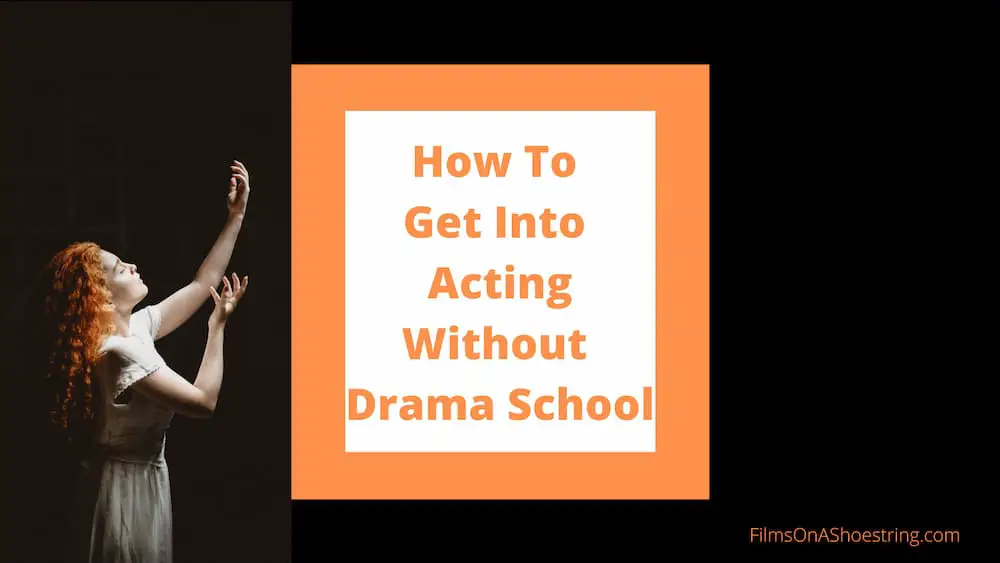Getting into acting without training from an accredited drama school is no easy matter, but it can be done.
If you’re wondering how to get into acting without drama school, there are plenty of things you can do to launch your career as a professional actor. But take note – you’ll have to discover your own ways to hone your performing arts skills, gain acting experience and work out how the industry works.
How to get into acting without drama school
- Leading drama schools develop actor’s craft, showcase seen by talent agents & casting directors
- Getting acting work is difficult whether or not you had formal training
- Without drama school training you need experience for CV & showreel – try casting websites
- Find alternative ways to practice acting technique & develop acting skill
- Find a decent talent agent willing to accept an aspiring actor without formal training
- Build a reputation as a hard working professional actor who is easy to work with
- Build and maintain a network of performing arts, theatre, TV & film contacts
- Keep persevering – you’ll work acting job to acting job, continually looking for new work
.
Do you need to go to drama school to be an actor?
You do not need to go to drama school to be an actor, and many famous actors started their career as a child actor or through life experience opportunities. However, every talent agent and casting director takes note of graduates from good and leading drama schools.
That’s because there’s intense competition to get in to drama school, so only a minority of talent going through the drama school audition rounds to access formal training. Many of the leading drama schools offer a year’s foundation course to young actors who show potential but aren’t quite in the cut for the three year acting degree. The foundation course is very expensive and beyond the reach of the average aspiring actor.
If you get to the final rounds of the drama school audition and receive a place on the acting degree for one of the leasing drama schools, you’ll receive broad and deep training programmes aimed at turning you from an aspiring actor into a professional actor.
Your acting class covers a range of performing arts skills, including acting technique, developing acting skill, gaining acting experience, the actor’s craft for theatre, film and TV.
Formal training should also prepare a student for the business of winning acting work, including self tape skills, acting audition technique workshops, building a showreel, and showcases in front of talent agents and casting directors.
So without formal training, you’ll have to find alternative ways to develop skills and gain acting experience.
Is drama school worth it?
It’s extremely difficult to get into an accredited drama school, and the high quality training is full time, intense and focused.
Casting directors and talent agents attend student showcases at leading drama schools, and take note of formal training on submitted CVs for musical theatre and acting jobs.
Be clear that drama school or Conservatoire training are often very different from the BA acting, drama or performing arts degrees at university. Their course focus and content is different, and they are perceived differently by acting agencies and casting directors.
Some accredited drama schools – providing intense training in acting, movement, voice, etc to a very small cohort – remain independent, while others have moved into university ownership.
Meanwhile, many university drama graduates – who receive less intense, more academic focussed study within a large student cohort – have carved out successful acting careers with or without an additional year at an acting school.
However, they are different in their setup, focus, expectations and delivery. If you want to be an actor, formal training at one of the leading drama schools is better – but very few applicants get through the highly competitive drama school audition rounds.
What subjects do you need to do to become an actor?
You don’t need any subjects or qualifications to become an actor. In the UK, you may need 5 GCSEs & 2 A-Levels to get on a drama or theatre studies degree course. But leading drama schools select by musical theatre and acting skill rather than academic performance.
Becoming a professional actor requires an in depth understanding of the industry, good audition technique, good acting technique, the right character to deal with career uncertainty and continually working for the next acting job, and the ability to get on with the talent agent or casting director auditioning you.
No, you don’t need a degree to become a professional actor, but you need a wide range of professional and personal skills.
Should I go to drama school?
If you’re determined to be a professional actor, drama school gives you the best start to an acting career. But if you can’t afford it, or can’t get in, then you must look for alternative routes into this difficult career.
Even the majority of drama school graduates struggle to find a reasonable income from the profession alone.
I can’t afford drama school
Many people can’t afford drama school because of the fees, living costs in an expensive city, and prohibition on part time work.
Student loans, career development loans, charity scholarships and fundraising campaigns rescue some, while others just seek other ways to train.
The financial situation for many potential acting students has become worse with the rise of foundation courses.
With so many people wanting access to top drama school courses, foundation degrees offer a year of intense training to improve your chances of getting on a 3 year degree course.
But the fees and living costs of a foundation course will exceed £20,000 and offer no guarantee of career success – or even a place on an acting degree course.
Can you be an actor without training?
Even if you want to get into acting without drama school, you do need to find a safe space to develop your actor’s craft. Ways to do this include a mix of:
- Private tuition
- Youth theatre/young actor companies
- National Youth Theatre membership, acting course, short course, theatre projects
- Local acting workshops
- Attend an acting class or short course at a drama school
- Casting director workshops
- High quality amateur dramatic/musical theatre societies
- Schemes such as the BBC Norman Beaton Fellowship
- Volunteer for student film roles
- Get involved with short films in front and behind the camera
- Self-taping monologues at home to analyse them
- Online resources, including The Mono Box and Collective Creative Initiative
The acting technique, skills, experience and knowledge you’ll need include:
- Acting audition
- Voice acting
- Creating characters with body and voice
- Tackling Shakespeare and classical texts
- How to work on modern texts
- Working with different casts and creative people
- Stage combat skills
- Business Skills for self employment – tax & admin, CVs & profiles etc
Actor training definition
Actor training develops skills in performance and acting. Behind it is acting technique, learning to bring characters to life, and lots of practice. Actor training is not about qualifications, although casting directors take note of top drama schools on CVs.
Can you become an actor without going to drama school?
Yes, you can become an actor without going to drama school. But you’ll have to find other ways to develop your acting skill, attend a one-off acting class or short course, and find ongoing opportunities to your acting technique.
You’ll also have to learn how the industry works, build industry connections, get decent showreel and experience, and make the most of every interaction with a casting director.
How to be an actor without going to acting school
Wondering how to become an actor with no experience? It is possible to be an actor without going to acting school, but you’ll have to work hard to build up experience:
- Train through workshops, short courses and private tuition
- Find classes in different disciplines and acting techniques
- Keep practising your skills at home
- Use online resources for actors (The Mono Box/Collective Creative Initiative etc)
- Take part in student films and short films via facebook groups
- Get free profiles on casting websites and upgrade to apply for jobs
- Take part in events such as Monologue Slam, Mandy Monologue Competitions etc
- Keep building your network & maintain great social media output
- Obtain good – but affordable – headshots
- Pull together a showreel, even if it’s a self taped monologue
- Find a decent acting agent who accepts beginners
- Take out a Spotlight subscription via agent/4 credits
- Email casting directors with your headshot & CV
- Accept self tape invitations and castings no matter how little notice
- Be prompt, appropriately dressed, and know your lines
- Be positive about everyone you work with and each projects
- Watch a lot of films to learn storytelling and characterisation
- Read a lot of plays to educate yourself about theatre
- Work in a theatre to learn more about the industry and see plays
How to get an agent without drama school
Talent agents attend drama school showcases to snap up promising new actors. Without this important drama school opportunity, you’ll have to work harder to get an agent. That means targeting agencies who accept aspiring actors without formal training on performing arts courses. Then, send a very good headshot and showreel.
Meanwhile, build up your CV by finding work through casting sites.
Need a Talent Agent?
Acting Agencies In South East England
Acting Agencies In South West England
Acting Agencies In North West England
Acting Agencies In North East England & Yorkshire
Acting Agencies In Central England
I want to become an actor – where do I start?
If you want to become a professional actor, start by attending classes and workshops in acting technique and acting audition technique. Attend a short course or workshops at leading drama schools if you can afford it.
Meanwhile, get your headshot and first showreel uploaded to casting sites and Facebook groups. Find roles on student films and commercials.
Then start contacting talent agencies. You can also send carefully tailored emails to casting directors.
What percentage of actors make it?
Actors are self employed. So they keep auditioning for new work throughout their acting career – and often do other jobs on the side too. Very few earn millions.
In fact, for most actors, just being able to pay the bills through commercials, TV, film, and stage work is a major achievement.
“A recent study by Queen Mary University of London referred to surveys that showed only 2% of actors make a living from the profession and that 90% are out of work at any one time would be sufficient to have most aspiring thespians reaching for the scotch, if only we could afford a drink in the first place.”
The Guardian, 5 June 2019
“Almost two-thirds of performers (63%) earned less than £5,000 from their profession in the last year, a survey suggests. That’s an improvement on the 77% figure from a similar 2014 survey of actors, musicians and dancers by entertainment recruitment firm The Mandy Network. But the latest survey found that half of the 3,000 members who responded took on unpaid roles every year. And 60% had to take second jobs outside entertainment to make ends meet. One in five had not had a paid job in the entertainment industry in the past six months, while just 13% took home more than £20,000 per year from performing, the survey found.”
BBC news 28 November 2018
Then along came a pandemic. Suddenly, every theatre, TV show and film set shut down. Reopening was slow and cautious, with many productions hit by covid related problems. How would you support yourself and your family in these circumstances?
So…can you get into acting without drama school?
Getting into acting without drama school is an uphill battle, but it’s a hard industry to succeed in even after three or four years as a performing arts student. Very few go on to become famous actors with glittering theatre or feature film careers, and the rest try to maintain an income from their chosen profession as long as they can. Mixing acting jobs with other work is normal.
Without formal training, you’ll have to take more responsibility to develop your actor’s craft, and work hard to gain acting experience. None of it is easy, even if you have a head start with years of life experience as a child actor.
But if you have the ambition, personality, acting skill, work hard and get an acting job out of an acting audition frequently enough to pay the bills, then nothing stops you launching your own acting career.






